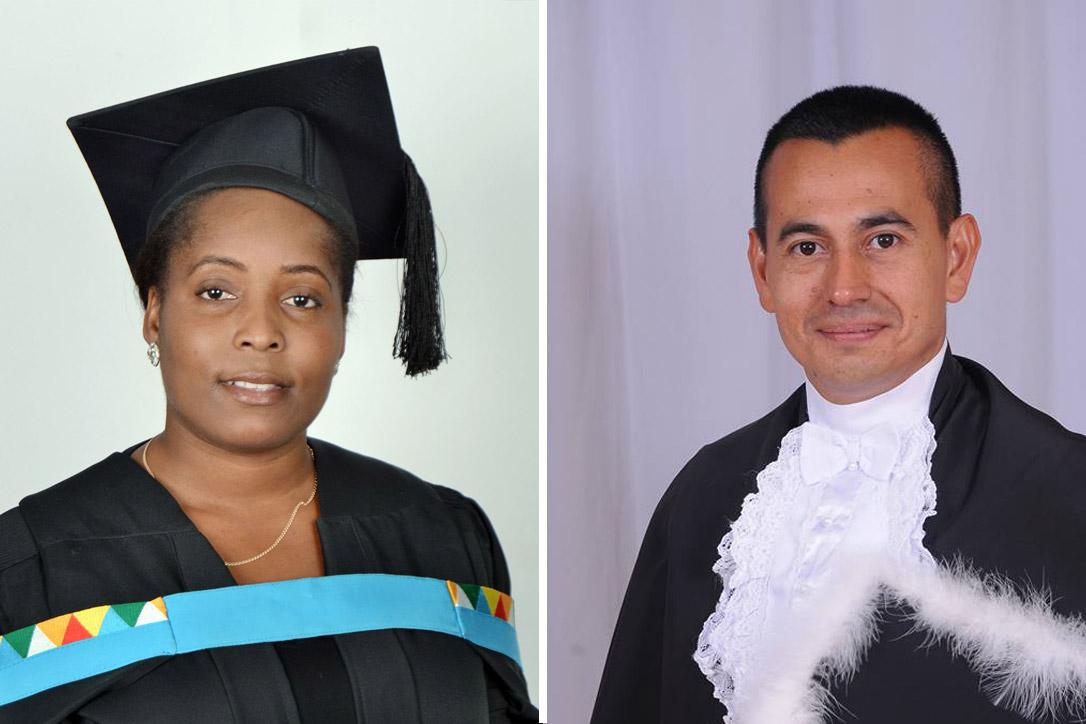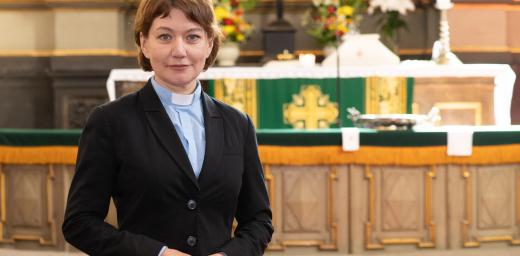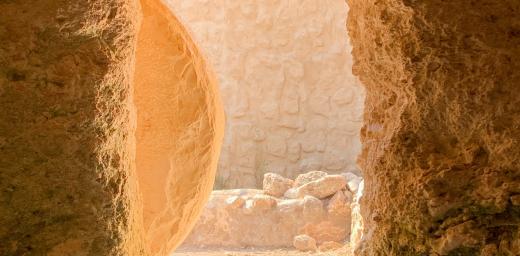Enhancing church capacity for transformation

Most graduates of theology on LWF-supported scholarships return home to serve their churches. Mozambican Zelda Cristina Cossa (left) studied in South Africa and Rev. Rolando Antonio Ortez MartÃnez, president of the Christian Lutheran Church of Honduras was a student in Brazil. Photos: Private
GENEVA, 13 June 2016 (LWI) – Most theologians and diaconal professionals trained through The Lutheran World Federation (LWF) Human and Institutional Capacity Development Program (HICD) return home to serve their churches and communities upon graduation, a recent survey confirmed.
An impact assessment study of returning professionals over a ten-year period indicates that over 80 percent of the more than 1,400 people who graduated between 2005 and 2014 are actively engaged in their churches and communities. The remaining either work in other sectors of society or are pursuing further studies.
LWF scholarship graduates from member churches in Honduras and Mozambique talked about the life-changing impact of the study support.
Leadership formation in Honduras
“The moment I received my degree is inexplicable, as this is a goal I had struggled to achieve for so many years. It was particularly moving because studying abroad is not easy or cheap: neither my church nor my family had the means,” says Rev. Rolando Antonio Ortez Martínez, newly installed President of the Christian Lutheran Church of Honduras.
On 5 June, Antonio, 42, was installed as pastor - president of the church which he had served for more than three decades in different capacities, most recently as general secretary.
He received an LWF scholarship for his first degree studies in theology at the Lutheran School of Theology (Faculdades EST) in São Leopoldo, Brazil, 2010-2015. “My graduation ceremony on 29 May 2016, a year after my vicariate, was a miracle. I feel encouraged to serve my church more and further my studies,” Antonio adds.
Established in 1983, Honduras’ Lutheran church has 1,500 members served by a team of four pastors, and its work is concentrated among the most disadvantaged sectors of the population. The new president sees his priorities as strengthening the Lutheran profile of the church, increasing the number of university graduate theologians from the current four and equipping pastors for evangelism and peace work in a country facing social violence especially organized crime by armed gangs. Encouraging women to study theology and take up leadership positions is also critical, he adds. “Women make up 95 percent of our church members. It is unusual that we don’t have a woman pastor.”
This is a goal I had struggled to achieve for so many years. It was particularly moving because studying abroad is not easy or cheap: neither my church nor my family had the means.
Mozambique: A stronger advocate for hope
For LWF scholarship holder Zelda Cristina Cossa, graduation from the University of Kwazulu-Natal in Pietermaritzburg, South Africa, on 18 April marked the beginning of “a long road to freedom.”
The 34-year-old member of the Evangelical Lutheran Church in Mozambique says, “Without the full LWF scholarship I would not have attained my theology degree [2009-2014], which included a one-year English language bridging course. I am also highly indebted to the LWF Communion Office for the various forms of support and encouragement throughout the course such as selected exposure to seminars and various training workshops.”
The Lutheran communion’s engagement in social justice issues and humanitarian response has been a source of inspiration for Cossa, who looks forward to serving her home, regional or global church again. She has been an active member of the ELCM youth work, including advocacy against environmental degradation. She participated in the 2005-2007 LWF communication training program for young adults in the member churches, “Towards a Communicating Communion - A Youth Vision.”
Cossa’s new qualifications make her “a stronger advocate and missionary of the gospel of Christ,” she says. “Theology is about helping people in the most humble manner. It should restore hope and strengthen those who have lost faith in a world with many people yearning for peace,” she adds.
Started in 1988, ELCM has 12,500 members. It prioritizes training of pastors and evangelists to enhance church growth, and strengthening its diaconal work including care for people affected by HIV and AIDS.
LWF Capacity for Diakonia Program coordinator Abebe Yohannes Saketa says these few examples affirm the goal of the LWF HICD program. “We want to support the member churches to strengthen their professional skills and competencies through various components of training including theological and pastoral formation. Our aim together with the churches is to promote good leadership and governance that enhance gender justice and youth participation.”





